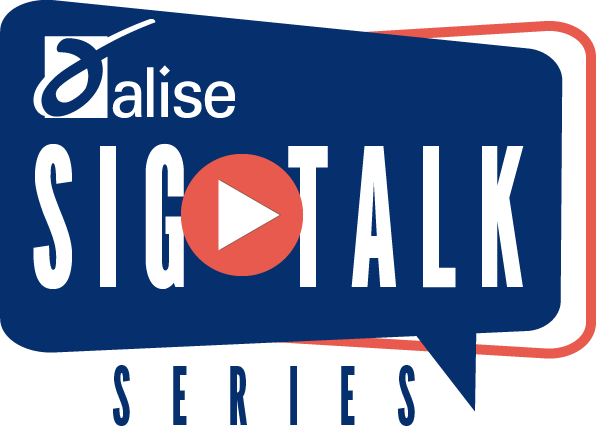Special Interest Groups (SIGs)Special Interest Groups provide a vehicle for ALISE members to share ideas, plans, news, and opinions related to a particular area of interest. The groups are distinct from the usual committee structure in that participation is voluntary rather than appointive, and there is no obligation to produce anything. Special Interest Groups can parallel ALISE Standing Committees, but the two serve distinct functions and should guard against confusing these functions. Members of Standing Committees are appointed and are charged with specific tasks. Special Interest Groups are encouraged to hold discussion meetings for the exchange of ideas. Consider joining our SIG listservs (referred to as e-lists)! The ALISE Listservs provides members with immediate access to a global network of library and information science professionals who can respond to queries in real time. Read more about the ALISE Listservs and how to sign up. Want less clutter in your inbox? Consider visiting the SIG Forums. The Forums provide an area for ALISE members to engage in conversation with one another, share files, and subscribe to their favorite topics. Forums work similar to the Listservs, but message threads live on the website and discussions and topics can easily be revisited. Read more about the ALISE Forums and how to sign up. Looking to connect with fellow SIG members? Find SIG members using one of two available directories:
Not sure which SIG to join? The SIG Talk series offers a brief (approximately 5 minute) introduction of the Special Interest Groups and what they can offer ALISE members.
|
CurriculumThe Curriculum SIG focuses on Library and Information Science (LIS) curriculum. |
||
Innovative PedagogiesThe goal of the Innovative Pedagogies SIG is to facilitate discussion and to provide a space where like minded individuals can come together to share/showcase novel approaches to pedagogy that are easy to replicate/utilize in the classroom and practice. |
Topics and Courses Cluster
Archival/Preservation EducationThe Archival / Preservation Education (ArchiPrEd) SIG aims to support archival educators in particular with their pedagogical and curricular activities. |
|
|
Disabilities in LISFounded in 2019, the Disability and Inclusion Special Interest Group of the Association for Library and Information Science Education is dedicated to addressing gaps and deficiencies in the state of disability inclusion in library and information science. |
|
|
Equity and Social Justice
The Equity and Social Justice SIG explores the state of affairs in ethnic, multicultural and humanistic concerns in LIS. The SIG has also expanded to create and promote discussions and activities related to social justice, equity, diversity, and inclusion and their role in the larger LIS profession. |
||
Gender IssuesThe Gender Issues SIG aims to address library and information science issues and research from a queer, feminist, and intersectional lens. In particular, it aims to explore how gender identities in all their forms impact the use of and engagement with information and information technologies. |
||
HealthThe Health SIG seeks to provide a collaborative forum for ALISE members to share ideas, knowledge, and expertise related to various health contexts. |
||
Historical PerspectivesThe Historical Perspectives SIG's purpose is to provide a space for teaching and scholarship related to historical aspects of librarianship, archives, and/or information, writ large. |
||
Information EthicsThe Information Ethics SIG advocates for and discusses information ethics, data ethics, related policy issues, and emerging ethical concerns. |
|
|
Information PolicyThe Information Policy SIG promotes and supports research on, and teaching about, information policy in the field of library and information science and the implementation and advocacy of information policy in library and information organizations and institutions. Information policy encompasses laws and policies related to the creation, use, storage, access, and dissemination of information. |
||
International Library EducationThe International Library Education SIG brings together ALISE members and LIS scholars interested in international and comparative librarianship. Members are committed to integrating international issues in LIS curriculum, identifying possibly global collaborations and partnerships, developing common understandings of LIS principles and practices, and providing students rich experiences like study abroad, exchange programs and international courses. |
||
School Library MediaThe School Library Media SIG brings school library professionals together to discuss and share information about current research and practices important to school librarianship. |
|
|
Metadata, Cataloging, & CollectionsThe Metadata, Cataloging, & Collections (MCC) SIG focuses on current research and practice in metadata, cataloging, and collection management education, as well as encouraging discussion on innovative and inclusive approaches to teaching in this area within the field of library and information science. Formerly Technical Services Education SIG. |
||
Youth ServicesThe Youth Services SIG is one of the Special Interest Groups of the Association for Library and Information Science Education (ALISE). Youth Services encompasses the areas of Public Library Youth Services and Youth Literature. The SIG's purpose is to bring together scholars and practitioners in these areas to share research and best teaching practices. |
|

